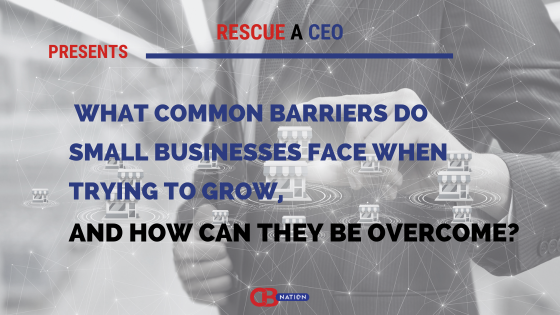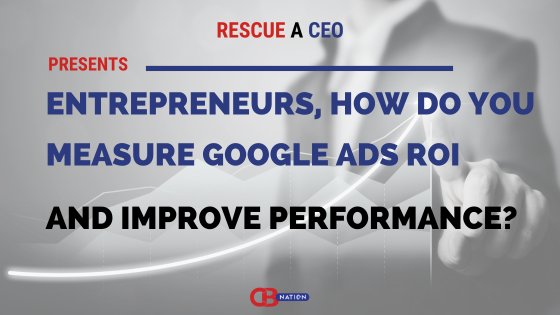Would you like to provide an answer to our weekly questions? Sign up for our newsletter to get the questions delivered each week to your inbox.
—-
There's a stereotype in the world of business about the businesspeople themselves. Either they need to be pure, outright sharks or sharks in the form of dolphins. The sharks go for the kill in business and they don't really care who sees them doing so. Their business skill is finely honed and they have made sure everyone knows it. For the puppies, it's a little more hidden. Puppies put on a very calm and kind exterior to the public but before long their shark comes bounding through in small, cunning ways. Of course, these stereotypes are false. Not everyone in the world of business is a shark or a puppy. And asserting yourself in business can still be done without using the same tactics as the shark and puppy. Below we asked some entrepreneurs and business owners to tell us how they assert themselves in business.
Follow CEO Blog Nation on LinkedIn!

Focus on asserting yourself in relation to your most passionate ideas
Asserting yourself in business is essential for those seeking to rise above and capitalize upon your own entrepreneurial ideas. After building several successful companies as an entrepreneur and researching and publishing about what makes a person an entrepreneur, I’ve learned the vital importance of communicating clearly your ideas to create an extraordinary vision for yourself and others. To assert yourself in business, begin with a clear vision of where you want to go. There’s no point in asserting yourself about insignificant matters and fuzzy notions. Focus on asserting yourself in relation to your most passionate ideas. For entrepreneurs, who tend to have a large number of ideas at any one time, this can be challenging. If you have 12 great ideas, whittle them down to just two or three at one time. Concentrate on asserting yourself by communicating consistently about those ideas. Be persistent and use a variety of methods – email, in-person discussions, meetings, printed writings, etc. to convey your ideas and persuade a core group of their viability. More importantly, be sure you have personal accountability in regards to these ideas. You * must* be willing to stick your neck out to test your concepts or no one else will follow you or listen when you assert yourself again.
Thanks to Bill J. Bonnstetter, Target Training International, Ltd.

Take business seriously, but don't take yourself too seriously
Take your business seriously but don't take yourself too seriously. This will give you the ability to infuse the “human” in human resources. It's really all about relationships. Not a transaction. The more you can relate to your client or potential client human being to human being, the more likely they are to do business with you. Remembering their wedding anniversary, or the fact they love the Chicago Bulls or that they hate Chocolate Chip cookies can go a long way.
Thanks to Jeff Rivera

Customer voice comes to mind
Customer Voice is the first thought that comes to mind. When you are talking to the world about relevance and your customer is contextualizing it for you, then you have demonstrated and answered a real need. No-one can dispute a customer, happy or un-happy. It's not how much money you have raised or the cool team you have put together but how you optimize these assets to satisfy a need as voiced by your customer, this makes you relevant. I find that real knowledge of your market, its dynamics, the stress points of your customer and the ability to articulate that in the design and performance of your product, with real data of utility and usability gives you greater business strength as opposed to wouldn't it be cool if. It is also vital that a business owner have a vision of the platform and not just a widget, we all have point fixes from personal insights but to bring a platform change that could have more expansive impact gives you presence with industry. Everything takes time and effort and humble confidence, with real customer knowledge is key to finding the right answers to build a business.
Thanks to Dr. Gopal Chopra, PINGMD
Related Post: Customer Service the Right Way

Volunteer for projects and offer to help others before they even ask
There are several ways to assert yourself in the workplace no matter your role within the organization. Your colleagues and clients perceive you based on many facets including your appearance, the way you speak, eye contact are all important factors. Being assertive means you need to stand out from others in your workplace. Volunteer for projects and offer to help others before they even ask for help. Pay attention to your body language. Try and stand upright, with broad shoulders and with your head level and upright. Having a professional appearance at all times is essential. Let your work habits and attitude at work define who you are. You don't always have to be loud or pushy to be assertive. You should also voice your opinion as often as you can. Even if others don't agree with you, it ensures that your voice is heard and that people know they can come to you for input in important matters.
Thanks to Matt Zajechowski, Digital Third Coast Internet Marketing

Having absolute confidence
The way I assert myself in business is with absolute confidence that the marketing services my firm offers helps my clients. If a business owner does not believe 100% in what his/her company sells, and that it brings tremendous value to customers, there is no point in being in business. Being assertive means you have the confidence to push forward and stand out because you believe wholeheartedly that your business provides value that your customers cannot find anyplace else.
Thanks to Peter Geisheker, The Geisheker Group, Inc.

No nonsense
Here are a few ways specifically that I assert myself on a day to day basis: 1. No nonsense – I don't play games or regularly joke around. I've found by maintaining a serious attitude I am respected more and treated seriously. This is a business that I care about and I am not here to play games. 2. Body language – I use serious gestures and try not to use passive aggressive gestures such as flailing my arms or rolling my eyes. Being conscious of body language has helped me enormously. 3. Boundaries – I don't let anyone touch me, with the exception of a handshake. I don't hug or touch anyone else either. This can send mixed signals and give off a message that I might not have intended to. 4. Take my time – If someone asks me a question, I don't usually answer them right away, unless it demands immediate attention. I take decisions very seriously, and think them out. This lets my employees know that I take decisions very seriously as well. 5. Being generally assertive – If I need someone to do something, I ask them to do it. If someone screws up, I tell them about it. Not being assertive can confuse staff members, and could allow bad habits to carry on longer then they need to.
Thanks to c, Elite Strategies, Llc

Showing up as who you really are
Asserting oneself into business can look and feel many different ways. Personally for me being an introverted creative female, I used to go about being assertive in business all the wrong way. I thought that to be successful I needed to be aggressive and go out there and claim business. This approach never worked. When instead I tried the approach of being more feminine and more mother-like business started streaming in. Mother-like looked like listening to a person's needs, encouraging them when they were down, and putting up with no crap when they made excuses and always challenging the person to be their best. I showed up as who I really up in business and in return I have a full practice.
Thanks to Lisa J Peck, Step It Up Enterprises
Related Post: Thinking Outside of the Box

Appear to be tough and strong from the start
I've been a business man all my life, and I find that a few things are always true. First of all, you have to appear to be tough and strong from the start. You can always ease up on employees, but you can't start out as a creampuff and get tough later. It just doesn't work. Second, you must build your business with posture. Set your guidelines and stick to them. No favorite employees. No fraternizing with employees or customers. You have to understand that the business is a living, breathing thing, and it must be nurtured. Third, and most importantly, DO ANYTHING YOU WANT IF YOUR BIG ENOUGH, or if you think your big enough. Sometimes just thinking your big enough will get you through.
Thanks to Lance A Mannion

Be direct and be decisive
As a former Wall Street advisor turned entrepreneur, I've had to learn how to get what I want over the years, professionally speaking of course. The first thing I learned is that you have to know what it is that you want. Once you know this, you can then go after it. You also have to be confident that you deserve whatever it is you want. Being upfront, honest, and most importantly, yourself with people are key things to keep in mind. Telling people what you need them to know as opposed to telling them what they want to hear is vital as well. Always remember – be direct and be decisive!
Thanks to Chike Uzoka, Valentine Global, LLC

Make a plan and think it through
The following is a simple and effective plan of action entrepreneurs can use to assert themselves in difficult situations, or when they feel they need to stand up for what they believe in: First, make a plan. Before speaking up on a tough issue, think it through. Make sure you are clear about what you want to accomplish, that your acting for the good of the business, the issue is worth fighting for and that, ultimately, it really matters. Next, build a network. A supportive network will help you succeed when asserting yourself. Make sure you have one or more influential people who will support you when you take action. Finally, plan the conversation. Before taking action, find the right time. When you are ready make sure you are asserting yourself based on facts (not gossip or heresay). Then be prepared for the outcome or feedback you receive from the other party.
Thanks to Stephen Ladek, Better On Demand
Related Post: Tips to Maximize Your Time



















































 |
|
Comments 1